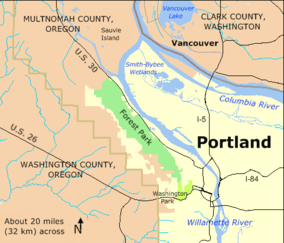| Forest Park | |
|---|---|
 Wildwood Trail in June 2008 | |
 Location of Forest Park and Washington Park in Portland | |
| Location | Multnomah, Portland, Oregon, United States |
| Coordinates | 45°32′43″N 122°44′10″W / 45.54528°N 122.73611°W |
| Area | 5,172.14 acres (20.9309 km2)[1] |
| Elevation | 718 ft (219 m)[2] |
| Established | 1948[1] |
| Named for | Urban forest reserve |
| Governing body | Portland Parks & Recreation Department |
Forest Park is a public municipal park in the Tualatin Mountains west of downtown Portland, Oregon, United States. Stretching for more than 8 miles (13 km) on hillsides overlooking the Willamette River, it is one of the country's largest urban forest reserves. The park, a major component of a regional system of parks and trails, covers more than 5,100 acres (2,064 ha) of mostly second-growth forest with a few patches of old growth. More than 80 miles (130 km) of recreational trails, including the Wildwood Trail segment of the city's 40-Mile Loop system, crisscross the park.
As early as the 1860s, civic leaders sought to create a natural preserve in the woods near Portland. Their efforts led to the creation of a municipal park commission that in 1903 hired the Olmsted Brothers landscape architectural firm to develop a plan for Portland's parks. Acquiring land through donations, transfers from Multnomah County, and delinquent tax foreclosures, the city eventually acted on a proposal by the City Club of Portland and combined parcels totaling about 4,000 acres (1,600 ha) to create the reserve. Formally dedicated in 1948, it ranks 19th in size among parks within U.S. cities, according to the Trust for Public Land.[3]
More than 112 bird species and 62 mammal species frequent the park and its wide variety of trees and shade-loving plants. About 40 inches (1,000 mm) of rain falls on the forest each year. Many small tributaries of the Willamette River flow northeast through the woods to pipes or culverts under U.S. Route 30 at the edge of the park. One of them, Balch Creek, has a resident trout population, and another, Miller Creek, supports sea-run species, including salmon.
Threats to the park include overuse, urban traffic, encroaching development, invasive flora, and lack of maintenance money. Occasional serious crimes and more frequent minor crimes occur in the park.
- ^ a b "Forest Park". Portland Parks & Recreation Department, City of Portland. 2008. Archived from the original on June 13, 2015. Retrieved May 27, 2008.
- ^ "Forest Park". Geographic Names Information System. United States Geological Survey, United States Department of the Interior. November 28, 1980. Retrieved May 5, 2008.
- ^ "150 Largest City Parks" (PDF). The Trust for Public Land. 2008. Archived from the original (PDF) on April 27, 2009. Retrieved April 7, 2009. The Trust for Public Land (TPL) lists the size of the park as 4,317 acres (1,747 ha), which is close to its original size of 1948. If the 5,157-acre (2,087 ha) size claimed by the Portland Parks & Recreation Department in 2009 were used in the TPL listing, Forest Park would rank 17th.